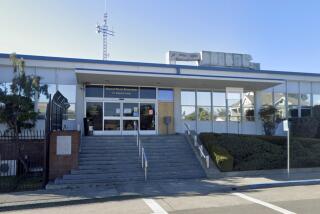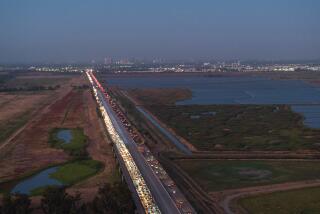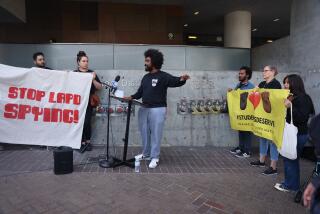Smartphone app from ACLU of California aims to preserve videos of police
- Share via
When George Holliday recorded grainy footage of Los Angeles police officers beating Rodney King outside his apartment in 1991, he sold the video to KTLA for $500 and watched it become a worldwide sensation. This year, a man used his cellphone to record a fatal LAPD shooting on skid row and uploaded the footage to Facebook, where it drew millions of viewers.
Now, in a sign of how amateur video has heightened scrutiny of police conduct, the American Civil Liberties Union has created an app for that.
The ACLU of California on Thursday unveiled a free smartphone app that allows users to send video of questionable police activity directly to the organization, protecting the recordings even if officers confiscate or try to tamper with the phones.
“We want to multiply the number of cameras that can be trained on police officers at any time,” said Hector Villagra, executive director of the ACLU of Southern California. “They need to know that anything they do could be seen by the entire world.”
But the idea of a civil liberties organization collecting evidence of possible police misconduct is also raising eyebrows.
Laurie Levenson, a professor at Loyola Law School, said there were serious privacy concerns — not so much for the user, but the person being filmed. She called it a “great irony” that the ACLU, a long-time champion of individual privacy, is now encouraging people to take videos of others.
“Everyone wants to keep an eye on the police. But in these incidents, the police are interacting with an individual involved in the worst conduct of their lives,” she said. “The ACLU needs to consider their privacy rights.”
Peter Bibring, a senior staff attorney for the ACLU of Southern California, said the organization wouldn’t publicize a video unless it showed a substantial issue that needed public attention.
“Obviously an interaction with a police officer isn’t someone’s brightest moment,” he said. “But when you weigh that against the 1st Amendment right to film police, the 1st Amendment wins out.”
The national debate over policing and race prompted by protests in Ferguson, Mo., has been fueled in part by videos showing encounters — some deadly — between officers and civilians.
Perhaps the most dramatic footage came from South Carolina, where on April 4 a man recorded a police officer shooting Walter Scott multiple times as Scott ran away. The officer had originally told investigators that he was afraid for his life, and fatally shot Scott after he grabbed for the officer’s stun gun. But shortly after the video emerged, the officer was charged with murder.
Last month in South Gate, a deputy U.S. marshal took the cellphone of a woman who was recording him and smashed it on the ground.
“As we’ve seen in headlines over the previous few months, recordings by members of the public is a crucial check on police abuse,” Bibring said. “We’ve seen a number of examples of high-profile incidents of abuse and unlawful shootings or killings that never would have come to light if someone wouldn’t have pulled out their phone.”
It’s far from clear how many people will download and use the “Mobile Justice CA” app or when video sent there may become public. One benefit of uploading such videos to YouTube, Facebook and social media is that they can immediately reach the public eye.
Users will have to open the app on their Android or Apple devices before filming, ACLU officials said. When the recording stops, it automatically sends a copy to the ACLU’s server and keeps the video on the phone.
A text report will then pop up, allowing users to explain in writing what they saw but allowing them to remain anonymous if desired. ACLU officials said their legal team would screen the reports and review any videos they believed might show problematic activity.
The video will belong to the person who filmed it, ACLU officials said. But under the app’s user terms, the organization will be able to distribute the footage for nonprofit use, including making the recording public.
Levenson said she believed the ACLU could be subpoenaed for the footage, not only by police and prosecutors, but also by attorneys representing people who were filmed. Bibring said that if the ACLU were to be subpoenaed, it would not “disclose anything without a fight.”
Other ACLU chapters that rolled out similar apps in a handful of other states last fall reported limited use. In Mississippi, about 275 Android users have submitted about 50 videos, a spokeswoman said. The numbers were higher in Missouri — about 570 recordings from about 2,500 Android users — but none raised any flags with ACLU officials.
New York City’s chapter in 2012 was the first to develop such an app, to address the NYPD’s controversial “stop-and-frisk” strategy. It has received an estimated 40,000 recordings since then, spokeswoman Jennifer Carnig said.
Many videos were of people playing around with the app, Carnig said, including one police officer who flipped off the camera. But, she said, there have been other recordings that show troublesome behavior such as officers using foul language or telling people they weren’t allowed to record.
“We never got a Rodney King moment — or we haven’t yet,” she said. “But we certainly have seen videos that really raise some serious questions about how police officers interact with the communities that they’re supposed to be protecting.”
Don “Jeff” Steck, president of the union that represents L.A. County deputy sheriffs, cautioned that videos don’t tell the whole story.
“It doesn’t show you the truth,” he said. “It shows you a piece of the truth.”
Patrisse Cullors, a director at the Ella Baker Center for Human Rights, said the ACLU’s app represents just how important video has become since Holliday captured those grainy images nearly 25 years ago. Now, she said, the proliferation of smartphones gives even more people the ability to hold police accountable.
“We are living in a moment where abuse of power is being challenged, being questioned and no longer being ignored,” she said.
But local law enforcement officials questioned how large an impact the app would have, given the number of cameras already out there.
“In our society, the people have a right to video the police,” L.A. County Sheriff Jim McDonnell said. “Police officers and deputy sheriffs are getting used to people with cameras everywhere.”
Follow @katemather for more law enforcement news.
More to Read
Sign up for Essential California
The most important California stories and recommendations in your inbox every morning.
You may occasionally receive promotional content from the Los Angeles Times.












